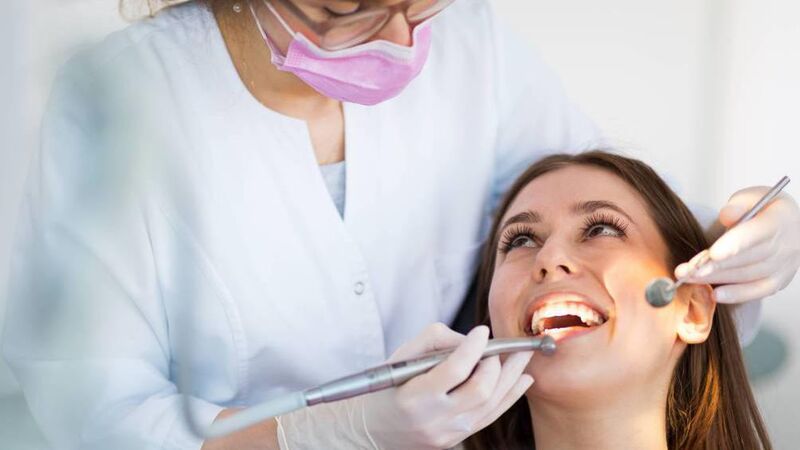Explainer: What is the Treatment Benefit Scheme?

Dental benefit is one aspect of the Treatment Benefit Scheme. Picture: iStock/posed by models
Treatment Benefit is a scheme run by the Department of Social Protection (DSP) to provide a limited financial contribution towards dental, optical and aural services. It is available to insured workers, the self-employed, and retired people who have the required number of PRSI contributions.
Under the Treatment Benefit Scheme, you may qualify for: dental benefit; optical benefit; hearing aids; or a hairpiece or wig.
Contact your treatment provider to check eligibility before proceeding with a treatment.
If you choose to have treatment in another EU member state, the DSP will pay an amount equivalent to that paid for similar treatments in Ireland or the amount actually paid for the treatment - whichever is the lower. You must still have the qualifying PRSI contributions.
Ccontact the Treatment Benefit Section before you travel to get an application form and details of the amounts the DSP will pay.
What is covered under Dental Benefit?
The DSP pays the full cost of an oral examination once a calendar year. A payment of €42 towards either a scale and polish or - if clinically necessary - periodontal treatment, is also available once a calendar year.
If the cost of either cleaning or periodontal treatment is more than €42, you must pay the balance - capped at €15 for a scale and polish. There is no cap on the balance charged for periodontal treatment.
Treatment is provided by private dentists on the DSP panel. Lists of dentists are available from the DSP, but most dentists are on the panel, so you should not have difficulty finding one. The dentist will check your eligibility and make a claim for you. The claim form will require details such as your PPS number, date of birth and signature. If you are a dependent spouse or civil partner, give the PPS number of the insured person, who will also be required to sign the claim form.
You may get tax relief on certain non-routine dental treatments.
What is covered under Optical Benefit?
The Treatment Benefit Scheme entitles you to a free eyesight test every two years. However, sight tests for VDUs and driving licences are not covered. You can get a set payment every two years, towards either one pair each of reading and distance spectacles, one pair of bifocal or varifocals, or one pair of contact lenses (including disposables). Cost will vary depending on the frames, with basic ones free.
The examination is provided by opticians, optometrists or ophthalmologists who have a contract with the DSP.
Does the Scheme cover medical lenses?
If you need contact lenses for medical reasons, you can get up to €1,000 towards the cost of a pair of medical contact lenses (€500 for each lens) every two years. This applies to a small number of eye conditions that make wearing glasses impossible. You must have a doctor’s recommendation. Contact lenses are not available on purely cosmetic grounds. Contact lenses for optical purposes are available through the Optical Benefit scheme above.
Are hearing aids available through this scheme?
These may be provided by suppliers who have a contract with the DSP, which pays the full cost of a hearing aid up to a maximum of €500 (€1,000 for a pair) every four years. It also pays the full cost of repairs to aids, up to a maximum of €100, every four years.
How can I get a hairpiece or wig through this scheme?
You can get up to €500 for one hair replacement item such as a hairpiece or wig, in each calendar year. It does not cover surgical or topical treatments. Hair loss must be from a disease or treatment of a disease such as cancer or certain types of alopecia.
How do I qualify for Treatment Benefit?
You must have paid Class A, E, H, P or S social insurance contributions. The amount of social insurance needed depends on your age. If you are under 21, you may qualify if you have paid at least 39 contributions at any time.
Those aged 21-28 may qualify if you have paid at least 39 contributions and at least 39 paid or credited in the governing contribution year (2023 is the governing contribution year for claims made in 2025) or have 26 paid contributions in each of the second and third last contribution years. For claims made in 2025, the second last contribution year is 2023 and the third last contribution year is 2022.
From the age of 29 to 65, you must have at least 260 paid contributions and at least 39 paid or credited contributions in the governing contribution year, or have 26 paid contributions in each of the second and third last contribution years. For claims made in 2025, the second last contribution year is 2023 and the third last contribution year is 2022.
People aged 66 and over must have 260 PRSI contributions paid at any time and 39 paid or credited contributions in the relevant tax year or the year immediately before it. The relevant tax year is the second last completed tax year before reaching 66 years of age.
Alternatively, they must have 260 PRSI contributions paid at any time and 26 paid contributions in both the relevant tax year and the year immediately before it.
There are, however, a number of exceptions to the above.
If you satisfy the conditions for Treatment Benefit when you reach pension age, you will remain qualified for life.
If you qualify for benefit at age 60-65, you retain that entitlement for life. If you have retired on grounds of ill health or are considered unemployed, you can apply for Illness Benefit or Jobseeker’s Benefit, subject to satisfying the statutory conditions. Your entitlement to these benefits may also lead to your being awarded credited contributions, which can be taken into account to extend coverage for treatment benefits for further periods.
Does a dependent spouse, civil partner or cohabitant have any entitlement to Treatment Benefit?
They may, of course, qualify in their own right. If they do not have enough social insurance contributions, they may still qualify for Treatment Benefit on your social insurance record. A dependent spouse, civil partner or cohabitant must:
Have a gross income of €100 or less per week. If earning more than €100 per week, he/she must have been dependent on you before entering or resuming insurable employment (at Class A, E, H, P or S).
Not be getting a social welfare payment (except Disablement Pension, Supplementary Welfare Allowance, Carer’s Benefit or Child Benefit). If getting Carer’s Allowance or State Pension (Non-Contributory), he/she can qualify if he/she was dependent on you immediately before getting the Allowance or Pension.
If an insured person dies and the dependent spouse or civil partner was entitled to benefit at the time of the death, they retain entitlement for as long as they remain widowed or a surviving civil partner.
How to apply for Treatment Benefit?
Claims are made through your provider (dentist, dispensing optician/optometrist/ophthalmologist or audiologist).
For treatment in other EU member states, contact the Treatment Benefit Section to confirm your eligibility.







 App?
App?




